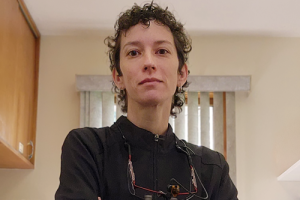Communication Degree Gives Teeth to Dental Patient Advocacy
Published August 22, 2025
 Jessica Davis, a soon-to-be graduate of the Johns Hopkins MA in Communication program, has traveled an interesting road to her degree completion. It’s a journey that has seen her master both automotive instrumentation as a parts, sales, and service manager and dental instrumentation as a now clinically practicing dental hygienist.
Jessica Davis, a soon-to-be graduate of the Johns Hopkins MA in Communication program, has traveled an interesting road to her degree completion. It’s a journey that has seen her master both automotive instrumentation as a parts, sales, and service manager and dental instrumentation as a now clinically practicing dental hygienist.
Inspired to follow her mother’s path within the automotive industry, Davis found success for more than a dozen years in the automotive parts and service industry. From part-time sales associate to store manager, this self-described “wrench turner” looked to pivot into a more flexible, family-friendly career with the birth of her son.
Deciding to take up the specialized tools of a dental hygienist, she earned a bachelor’s degree from the Pennsylvania College of Technology.
“I think that dentistry is one of those industries that is slow to change, and in a lot of ways, there is merit to that,” she said. “But I also think there is room for innovation. I was not fully prepared for the lack of growth opportunities. As someone who has always worked their way up the chain, it was different in dentistry. When you enter a practice as a dental hygienist, you retire from said practice as a dental hygienist. There is no momentum to gain. I didn’t comprehend that reality until I was in it.”
However, her career switch did help her to determine what she most liked about dentistry – patient education and advocacy. Davis decided to enroll at Hopkins to pursue a graduate degree with a concentration in Health Communication that would allow her to make the changes that she sought in a field that she has come to love.
“The number one thing that I hope to bring away from Hopkins and back to dentistry is improvements to the way that dentistry talks to patients,” she said. “The JHU program has been the perfect fit for me because, as a hygienist, I often spend more time with patients than the dentists themselves. Hygienists can tell so much by looking into someone’s mouth. Are you getting enough B vitamins, iron, water? How are your blood sugars? Do you need to up your calcium? Have you had your A1C levels tested lately? We see everything from oral, throat, and thyroid cancers to clogged arteries and even melanoma. My clinical findings can be used to remind patients of the importance of good oral health.”
With an eye toward December 2025 graduation, Davis will devote the fall to developing her thesis – a research-based examination of patient experiences and their perceptions of the accessibility of oral healthcare for Medicaid patients.
“As a clinician, I get a lot of patients who tell me, ‘Oh, I didn’t get this done because my insurance doesn’t cover it. I can’t go to that dental practice because they don’t take my insurance.’ It is often the patients who need the care the most who are telling me these things. Navigating the resources and gaining access to services can be awkward and clunky and difficult. I would like to find a solution for this. I have found, during my research, that health disparities in clinical interaction, and what actually works when it comes to patient communication, need a different focus beyond marketing-based research. I think, ultimately, my JHU degree will lead me to a further focus on research. Given the innovation that has been coming out of dentistry lately through artificial intelligence, there is a lot of opportunity for growth and investment from organizations when it comes to patient education. I am excited to start doing that.”
While many of her classmates entered the program from a writing background, Davis was not dissuaded or intimidated but instead open-minded and now optimistic about her decision to complete her master’s degree.
“As someone who is almost 40, it is very hard to commit yourself to something like a master’s program, and a thesis that requires a level of academic rigor, and not be apprehensive,” she said. “But every single Hopkins professor I have had has been a wealth of knowledge. They have been very passionate and encouraging, and they all found my insights, as a non-traditional student, interesting. I would tell anyone who is interested in communication to pursue this degree at Johns Hopkins because they will show you the science behind how to communicate effectively. It is very challenging, but if you are willing to put in the work and take ownership, this program really sets people up for success, and it does so in an online format. I completed my bachelor’s degree online, and I did not have half the resources or the engagement that I do here at Johns Hopkins. They – the faculty and the students – are in it to win it. It is astounding and amazing.
“I think this degree will help me grow this conversation,” Davis continued. “I need to help raise up voices of, not just hygienists, but any dental professional who agrees that it’s time to re-think how we are communicating with patients, because it is not effective. There are a lot of dental hygienists, in particular, who are tired of giving the same speeches and having no change and not feeling supported, My Hopkins master’s will allow me to drive change.”
Attention: Students and Alumni
Are you a current AAP student or alumni and want to share your accomplishments?
Interested in pursuing a graduate degree at Johns Hopkins University?
Request information to learn more or apply here.